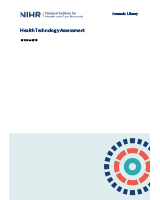This work was produced by Edwards et al. under the terms of a commissioning contract issued by the Secretary of State for Health and Social Care. This is an Open Access publication distributed under the terms of the Creative Commons Attribution CC BY 4.0 licence, which permits unrestricted use, distribution, reproduction and adaptation in any medium and for any purpose provided that it is properly attributed. See: https://creativecommons.org/licenses/by/4.0/. For attribution the title, original author(s), the publication source – NIHR Journals Library, and the DOI of the publication must be cited.
NCBI Bookshelf. A service of the National Library of Medicine, National Institutes of Health.
Edwards SJ, Karner C, Jhita T, et al. Abrocitinib, tralokinumab and upadacitinib for treating moderate-to-severe atopic dermatitis. Southampton (UK): National Institute for Health and Care Research; 2024 Jan. (Health Technology Assessment, No. 28.04.)

Abrocitinib, tralokinumab and upadacitinib for treating moderate-to-severe atopic dermatitis.
Show detailsThe Evidence Assessment Group would like to thank Victoria Wakefield (Principal Clinical Evidence Analyst, BMJ-TAG), Ben Mayer (Senior Clinical Evidence Analyst, BMJ-TAG) and Conor Hickey (Associate Health Economist, BMJ-TAG) for their assistance with title and abstract appraisal and data extraction and quality assurance of the model.
Contribution of authors
Steven J Edwards (https://orcid.org/0000-0002-9049-3421) was the project lead: supervised the production of the final report; critical appraisal of the clinical evidence; and critical appraisal of the economic evidence.
Charlotta Karner (https://orcid.org/0000-0003-3855-4853) was involved in study selection, data extraction, critical appraisal of the clinical evidence; carried out network meta-analyses; and contributed to writing the clinical sections of the report.
Tracey Jhita (https://orcid.org/0000-0002-8041-0346) was involved in study selection; data extraction; critical appraisal of the economic evidence; development of the conceptual model; quality assurance of the economic model; and writing the economic sections of the report.
Samantha Barton (https://orcid.org/0000-0001-7051-5112) devised and carried out the literature searches on clinical effectiveness; contributed to study selection, data extraction, critical appraisal of the clinical evidence; and contributed to writing the clinical sections of the report.
Gemma Marceniuk (https://orcid.org/0000-0001-9365-0384) devised and carried out the economic literature searches; study selection; data extraction; critical appraisal of the economic evidence. Development of the economic model and carried out the economic analysis and contributed to writing the economic sections of the report.
Zenas Z N Yiu (https://orcid.org/0000-0002-1831-074X) supplied expert clinical advice throughout the project – including reading and commenting on the final report.
Miriam Wittmann (https://orcid.org/0000-0003-2328-4926) supplied expert clinical advice throughout the project – including reading and commenting on the final report.
All authors read and commented on draft versions of the ERG report. Requests for access to data should be addressed to the corresponding author. Ethics approval was not required as this is secondary research conducted as part of the NICE technology assessment programme.
Data-sharing statement
Further information and requests for access to the data used in this report can be obtained from the corresponding author.
Ethics statement
No ethical approval was needed as all included data were from secondary published sources.
Disclaimers
This report presents independent research funded by the National Institute for Health and Care Research (NIHR). The views and opinions expressed by authors in this publication are those of the authors and do not necessarily reflect those of the NHS, the NIHR, the HTA programme or the Department of Health and Social Care. If there are verbatim quotations included in this publication the views and opinions expressed by the interviewees are those of the interviewees and do not necessarily reflect those of the authors, those of the NHS, the NIHR, the HTA programme or the Department of Health and Social Care.
- Acknowledgements - Abrocitinib, tralokinumab and upadacitinib for treating moder...Acknowledgements - Abrocitinib, tralokinumab and upadacitinib for treating moderate-to-severe atopic dermatitis
- Assessment of evidence - Total hip replacement and surface replacement for the t...Assessment of evidence - Total hip replacement and surface replacement for the treatment of pain and disability resulting from end-stage arthritis of the hip (review of technology appraisal guidance 2 and 44): systematic review and economic evaluation
- List of abbreviations - Anaesthetic–analgesic ear drops to reduce antibiotic con...List of abbreviations - Anaesthetic–analgesic ear drops to reduce antibiotic consumption in children with acute otitis media: the CEDAR RCT
- List of abbreviations - Bisphosphonate alternative regimens for the prevention o...List of abbreviations - Bisphosphonate alternative regimens for the prevention of osteoporotic fragility fractures: BLAST-OFF, a mixed-methods study
- Conclusions - KRAS mutation testing of tumours in adults with metastatic colorec...Conclusions - KRAS mutation testing of tumours in adults with metastatic colorectal cancer: a systematic review and cost-effectiveness analysis
Your browsing activity is empty.
Activity recording is turned off.
See more...